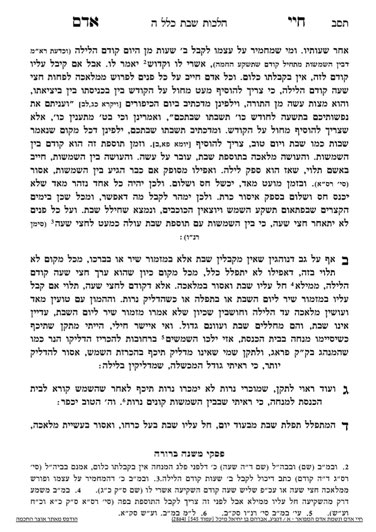We are beginning siman 2, where the Chayei Adam discusses what a person needs to do in order to accept Shabbos. The question will depend on whether tosefes Shabbos is automatically added to Shabbos, or whether one must intentionally add it on. Within the possibility that one must intentionally accept tosefes Shabbos, we will need to discuss what must be added in order to accept it.
The Chayei Adam writes that even though the minhag of many people is to accept Shabbos through an action, such as barechu or mizmor shir, it is not necessary, because it is accepted automatically.
We need to discuss some background. We must remember that until 300-400 years ago, we did not have kabbalah Shabbos, as it was not added to the siddur until that time period. Even when it was added, it was not necessarily accepted by all of Klal Yisroel. The Chasam Sofer writes that when he grew up in Frankfurt, Kabbalas Shabbos was optional, and those who wanted to say it would come to Shul early. There would be a break between kabbalas Shabbos and maariv, and those who did not recite kabbalas Shabbos would not arrive until it was time for maariv. It was instituted by the gedolim of Tzfas at the time of the Arizal. It is recited from the bimah, rather than the chazan’s amud, to differentiate and demonstrate that kabbalas Shabbos is not obligatory like a regular tefillah.
Thus, when a shul did not recite kabbalas Shabbos, they would accept Shabbos (including tosefes Shabbos) with barechu, and if they did recite kabbalas Shabbos, they would accept it with mizmor shir. (Some suggest it is accepted with bo’i kallah in lecha dodi.)
Either way, these points in davening at which they would accept Shabbos are predicated on the assumption that one must verbalize their acceptance of Shabbos and/or tosefes Shabbos. However, the Chayei Adam writes that it is not necessary to discuss at which point one accepts tosefes Shabbos, as it takes effect automatically 30 minutes prior to nightfall. However, if a person wishes to add on a larger amount of tosefes Shabbos, they may be able to do so through hadlakas neiros or mizmor shir.
Summary
According to the Chayei Adam, it is only in regards to accepting a larger amount of tosefes Shabbos that a verbal declaration or physical action may be necessary, as the minimal amount of tosefes Shabbos takes effect automatically 30 minutes before nightfall.



